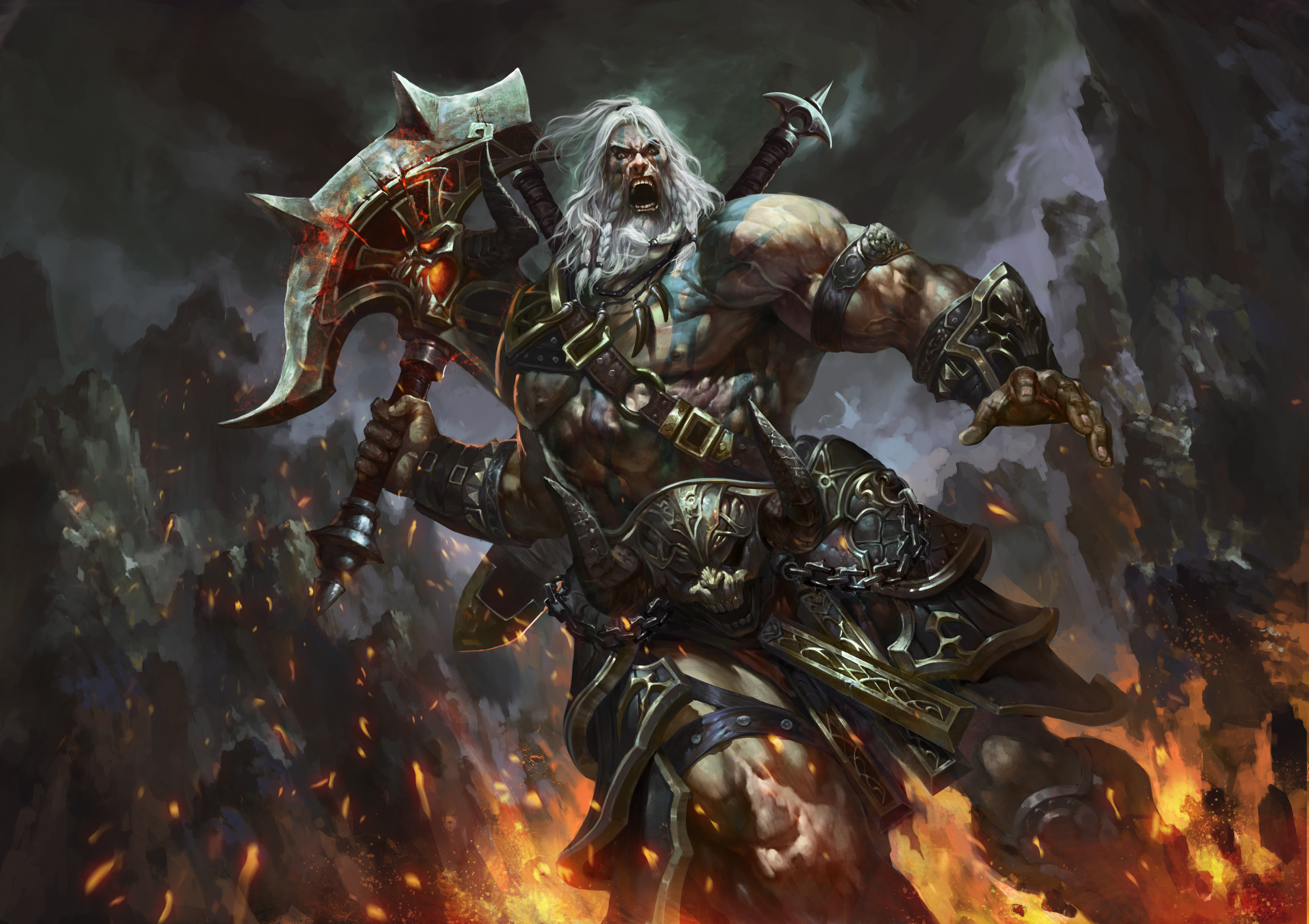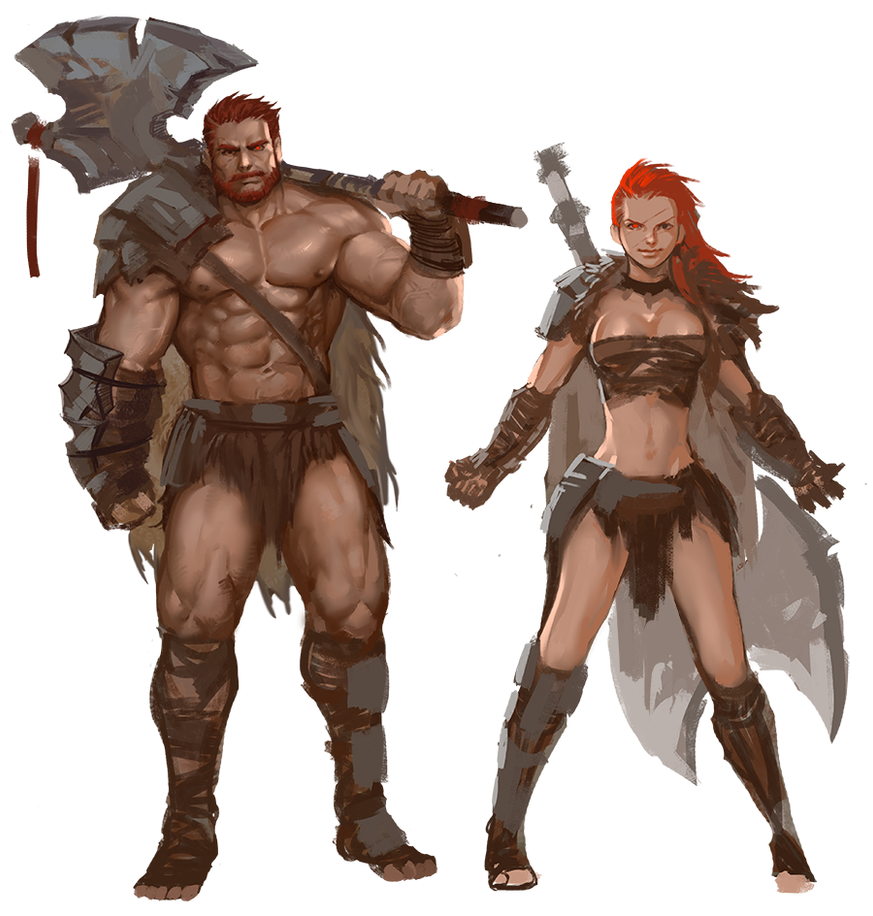Barbarian
Barbarian (from Greek βάρβαρος, Barbaros plural βάρβαροι, barbaroi ) was the original name in ancient Greece for all those who do not ( or bad) spoke Greek (literally Stammler, stutterers, actually: br- br- Sager ). In parallel, from the Indians the Sanskrit word barbarah ( plural ), Stammler, Laller ' used to refer to alien peoples. (Cf. the German saying: I only understood " rhubarb rhubarb ". )
In modern usage, the term is derogatory " raw uncivilized, uneducated people " used to mean.
On the importance
In the Greek area, the term first appears in Homer ( Iliad II, verse 867 ), in reference to the " barbaric speaking " ( barbarophonoi ) Carians of Asia Minor.
The collective term barbarian was henceforth determined for all non-Greeks, for folks so, who did not speak Greek or not worshiped the Olympian gods. This was first probably not an expression of contempt. In Homer's description of some barbarians had a role model: the Trojan Hector in the Iliad, in the Trojan War was a barbarian hero. Also in the histories of Herodotus, the introduction is significant, where he speaks of the glory parallelisierend the Greeks and barbarians. However, already converted from the 6th century BC the term. So later were generally culturally inferior, whether Greeks or not, "barbarians" referred to as - the democratic Athenians called, for example, the warlike Lacedaemonians Sparta "barbarians".
The Romans, who were initially even the Greeks as barbarians, took over the label " barbarus " for all men without Greco- Roman culture, since the Romans learned to appreciate the culture and education of the defeated Greeks since the second century BC. Therefore, the Greeks had formed a privileged position in society with the Romans. They were in the Roman families (eg, the Scipios ) as an educator employed (see Polybius ), and Greek philosophy and education was also honored in the Roman Empire high. Among the Romans this was possible because the origin had a subordinate role. For the Romans, people were barbaric therefore without Greco- Roman culture ( paideia ). It was in late antiquity readily possible to no longer apply through the acquisition Greco- Roman culture as a barbarian. To denote a citizen of Rome as a " barbarus " was a gross insult. In modern research, the area outside the Empire is sometimes referred to as a barbarian.
In European history theories of the 18th and 19th century, the term was used to characterize a phase in the linear -understood development process of mankind. Here, the "savages" ( hunter- gatherer cultures ) were distinguished the "barbarians" ( agrarian or nomadic cattle breeders cultures) and the "civilized " ( agrarian and urban, schriftverwendende state cultures ).
In today's word usage, the term pejoratively referred to people whose standards of behavior less "civilized", ie are characterized by less self- control than the standard of the person, each uses the term. The so- named person is perceived thus eg a violent, loud or direct in emotional expression. Other derogatory terms with similar meaning are as: Person with " uncut ", " uncivilized ", " primitive ", " Wi- culture " or " raw " behavior.
The antonym of " barbaric" is now accordingly as " civilized".
Conceptual history
The concept of the barbarian has undergone many change of meaning to the present day. Therefore, one can not assume a specific designation, but rather it is a metaphor, which changed the course of history.
- Ancient Greece: Even in ancient times, walked the barbarian from the " spokesman of a harsh language" in Homer to a non- Greeks in Herodotus. Aeschylus in his play The Persians called the Persian ships under the Persian king Xerxes I as a barbarian fleet. Thus, the term barbarian already in Ancient Greece greatly changed in its meaning.
- Middle Ages In the Middle Ages the idea of the barbarian is closely linked with that of the heathens. Thus, in comparison to the Christian West, technically and culturally advanced Arabs were barbarians.
- Turning to modern times: with the expeditions at the turn of the modern era, a differentiation of the barbarians term begins. Thus, for example, the Chinese, which Marco Polo described, rather perceived as exotic, while the indigenous peoples of North, Central and South America were more likely referred to as barbarians. The African slaves took it the lowest place in the reception hierarchy.
- Humanism: The romanticized image of the barbarian as a cultural projection figure in the 18th and 19th centuries should be considered in conjunction with Jean-Jacques Rousseau's idea of the " noble savage ".
Barbarian in the Fantasy Genre
In the fantasy genre barbarians are represented as mighty warriors who come from an archaic culture and maintain a more aggressive fighting style. They are usually described as brutal, short-tempered and primitive, but also as a brave, tough and direct and honest. This is in addition to books for " Conan " as well as in the universe of " Dungeons and Dragons " or in the action role-playing game "Diablo III " and films like " The 13th Warrior " of the case. The Gjalskerländer in " The Dark Eye " or the Wasa in the world of " Middle Earth " are considered as typical barbarians.










